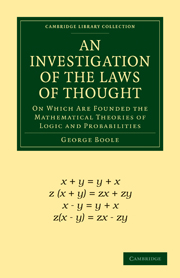 An Investigation of the Laws of Thought
An Investigation of the Laws of Thought Book contents
- Frontmatter
- PREFACE
- Contents
- CHAPTER I NATURE AND DESIGN OF THIS WORK
- CHAPTER II SIGNS AND THEIR LAWS
- CHAPTER III DERIVATION OF THE LAWS
- CHAPTER IV DIVISION OF PROPOSITIONS
- CHAPTER V PRINCIPLES OF SYMBOLICAL REASONING
- CHAPTER VI OF INTERPRETATION
- CHAPTER VII OF ELIMINATION
- CHAPTER VIII OF REDUCTION
- CHAPTER IX METHODS OF ABBREVIATION
- CHAPTER X CONDITIONS OF A PERFECT METHOD
- CHAPTER XI OF SECONDARY PROPOSITIONS
- CHAPTER XII METHODS IN SECONDARY PROPOSITIONS
- CHAPTER XIII CLARKE AND SPINOZA
- CHAPTER XIV EXAMPLE OF ANALYSIS
- CHAPTER XV OF THE ARISTOTELIAN LOGIC
- CHAPTER XVI OF THE THEORY OF PROBABILITIES
- CHAPTER XVII GENERAL METHOD IN PROBABILITIES
- CHAPTER XVIII ELEMENTARY ILLUSTRATIONS
- CHAPTER XIX OF STATISTICAL CONDITIONS
- CHAPTER XX PROBLEMS ON CAUSES
- CHAPTER XXI PROBABILITY OF JUDGMENTS
- CHAPTER XXII CONSTITUTION OF THE INTELLECT
- ERRATA
CHAPTER XV - OF THE ARISTOTELIAN LOGIC
Published online by Cambridge University Press: 05 November 2011
- Frontmatter
- PREFACE
- Contents
- CHAPTER I NATURE AND DESIGN OF THIS WORK
- CHAPTER II SIGNS AND THEIR LAWS
- CHAPTER III DERIVATION OF THE LAWS
- CHAPTER IV DIVISION OF PROPOSITIONS
- CHAPTER V PRINCIPLES OF SYMBOLICAL REASONING
- CHAPTER VI OF INTERPRETATION
- CHAPTER VII OF ELIMINATION
- CHAPTER VIII OF REDUCTION
- CHAPTER IX METHODS OF ABBREVIATION
- CHAPTER X CONDITIONS OF A PERFECT METHOD
- CHAPTER XI OF SECONDARY PROPOSITIONS
- CHAPTER XII METHODS IN SECONDARY PROPOSITIONS
- CHAPTER XIII CLARKE AND SPINOZA
- CHAPTER XIV EXAMPLE OF ANALYSIS
- CHAPTER XV OF THE ARISTOTELIAN LOGIC
- CHAPTER XVI OF THE THEORY OF PROBABILITIES
- CHAPTER XVII GENERAL METHOD IN PROBABILITIES
- CHAPTER XVIII ELEMENTARY ILLUSTRATIONS
- CHAPTER XIX OF STATISTICAL CONDITIONS
- CHAPTER XX PROBLEMS ON CAUSES
- CHAPTER XXI PROBABILITY OF JUDGMENTS
- CHAPTER XXII CONSTITUTION OF THE INTELLECT
- ERRATA
Summary
THE ARISTOTELIAN LOGIC AND ITS MODERN EXTENSIONS, EXAMINED BY THE METHOD OF THIS TREATISE.
The logical system of Aristotle, modified in its details, but unchanged in its essential features, occupies so important a place in academical education, that some account of its nature, and some brief discussion of the leading problems which it presents, seem to be called for in the present work. It is, I trust, in no narrow or harshly critical spirit that I approach this task. My object, indeed, is not to institute any direct comparison between the time-honoured system of the schools and that of the present treatise ; but, setting truth above all other considerations, to endeavour to exhibit the real nature of the ancient doctrine, and to remove one or two prevailing misapprehensions respecting its extent and sufficiency.
That which may be regarded as essential in the spirit and procedure of the Aristotelian, and of all cognate systems of Logic, is the attempted classification of the allowable forms of inference, and the distinct reference of those forms, collectively or individually, to some general principle of an axiomatic nature, such as the “dictum of Aristotle:” Whatsoever is affirmed or denied of the genus may in the same sense be affirmed or denied of any species included under that genus. Concerning such general principles it may, I think, be observed, that they either state directly, but in an abstract form, the argument which they are supposed to elucidate, and, so stating that argument, affirm its validity; or involve in their expression technical terms which, after definition, conduct us again to the same point, viz., the abstract statement of the supposed allowable forms of inference.
- Type
- Chapter
- Information
- An Investigation of the Laws of ThoughtOn Which Are Founded the Mathematical Theories of Logic and Probabilities, pp. 226 - 242Publisher: Cambridge University PressPrint publication year: 2009First published in: 1854
